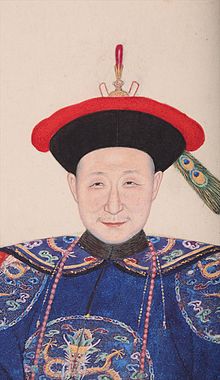
Back فوك انجان ARZ Fuk'anggan Spanish Fuk'anggan French Fuk'anggan ID フカンガ Japanese 복강안 Korean Фуканъань Russian ฟู่คังอัน Thai Fuk'anggan Uzbek Phúc Khang An Vietnamese
Fuk'anggan | |
|---|---|
 | |
| Grand Councillor | |
| In office 1783–1784 | |
| In office 1776–1777 | |
| In office 1772–1772 | |
| Grand Secretary of the Wuying Hall | |
| In office 1792–1796 Serving with Agui | |
| Preceded by | Agui |
| Succeeded by | Agui |
| Assistant Grand Secretary | |
| In office 1786–1792 | |
| Minister of Personnel | |
| In office 1786–1792 | |
| Preceded by | Heshen |
| Succeeded by | Jin Jian |
| Viceroy of Liangguang | |
| In office 19 February 1789 – 14 September 1793 | |
| Preceded by | Sun Shiyi |
| Succeeded by | Changlin |
| Personal details | |
| Born | 1748 |
| Died | 1796 (aged 47–48) |
| Relations | Fuheng (father) Empress Xiaoxianchun (aunt) Qianlong Emperor (uncle-in-law and rumored biological father) Yonglian (paternal first cousin) Gurun Princess Hejing (paternal first cousin) Yongcong (paternal first cousin) Consort Shu (Qianlong) (maternal aunt) |
| Clan name | Fuca |
| Courtesy name | Yaolin (瑤林) |
| Posthumous name | Wenxiang (文襄) |
| Military service | |
| Allegiance | Qing Dynasty |
| Branch/service | Manchu Bordered Yellow Banner |
| Battles/wars | Jinchuan campaigns Lin Shuangwen rebellion Sino-Nepalese War Miao Rebellion (1795–1806) |
Fuk'anggan (Manchu:ᡶᡠᠺᠠᠩᡤᠠᠨ, Möllendorff: fuk'anggan;[1][2] Chinese: 福康安; pinyin: Fúkāng'ān; 1748–1796), courtesy name Yaolin (simplified Chinese: 瑶林; traditional Chinese: 瑤林; pinyin: Yáolín), was a Manchu noble and general of the Qing Dynasty. He was from the Fuca clan (Chinese: 富察) and the Bordered Yellow Banner of the Eight Banners.
Fuk'anggan's father, Fuheng, brother of the Empress Xiaoxianchun, served as a grand minister of state during the middle years of the reign of the Qianlong Emperor. Fuk'anggan held various offices throughout Qianlong's reign, including Governor-General, Viceroy of Liangjiang and Viceroy of Liangguang.
The Salar Jahriyya Sufi revolt in Gansu was put down by Fuk'anggan along with Agui and Li Shiyao in 1784,[3][4] while Heshen was recalled for his failure during the revolt.[5]
In 1787, 300,000 people took part in the Lin Shuangwen rebellion in Taiwan against the Qing government. Fuk'anggan commanded 20,000 troops and suppressed the rebellion.[6] In 1790, the Nepalese Gurkha army invaded Tibet and the 8th Dalai Lama, Jamphel Gyatso, escaped from Lhasa and appealed to the Qing government for help. The Qianlong Emperor appointed Fuk'anggan as commander-in-chief of the Tibetan campaign and Fuk'anggan attacked until they reach Nuwakot and being keen to protect their troops went for negotiation in the Sino-Nepalese War.[7]
- ^ Anonymous 1795, p. 84
- ^ Academia Sinica. "Fuk'anggan". Academia Sinica. Archived from the original on 2018-01-06. Retrieved 2018-01-05.(in Chinese)
- ^ Hummel, Arthur W. Sr., ed. (1943). . Eminent Chinese of the Ch'ing Period. United States Government Printing Office.
- ^ Hummel, Arthur W. Sr., ed. (1943). . Eminent Chinese of the Ch'ing Period. United States Government Printing Office.
- ^ Hummel, Arthur W. Sr., ed. (1943). . Eminent Chinese of the Ch'ing Period. United States Government Printing Office.
- ^ Hummel, Arthur W. Sr., ed. (1943). . Eminent Chinese of the Ch'ing Period. United States Government Printing Office.
- ^ "Nepal and Tibetan conflict". Official website of Nepal Army. Archived from the original on 2016-12-20. Retrieved 2017-04-29.